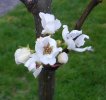- Joined
- Feb 23, 1999
- Messages
- 4,855
Red Flower and I have been busy today, working around the yard, planting flowers, and translating.
We just put up this spring couplet on the arch.

It was written by the Qing Dynasty scholar Zheng Ban Qiao. Freely translated it reads:
***********************************************
We also found another plaque for in the house.

I'm not sure who wrote this one. It could have been one of the ancient sages, or maybe the guy from the fortune cookie factory was moonlighting ...
Anyway, we thought it was pretty good and hung it up in the house.
We just put up this spring couplet on the arch.
It was written by the Qing Dynasty scholar Zheng Ban Qiao. Freely translated it reads:
Anticipating the springtime, when the flowers come and everything is different and new.
In late autumn the numerous manifestations disappear, in the move toward simplicity the bare tree stands alone.
***********************************************
We also found another plaque for in the house.
Health Preserving Poem
The sun rises in the eastern sea and sets in the western mountains.
Unhappy it's one day, or happy it's still one day.
Don't take unnecessary pains to study an insoluble problem.
(then you'll be) comfortable in body and heart.
Who supplies your money? Don't be agitated if there is a lot of it or not much.
A little meat and lots of vegetables, three meals every day. Eating good food or poor food, enjoy the fragrance and the flavor.
Don't worry if your clothes are new or old. Either will protect you from the cold.
Frequently chat with your friends. Talk about the current situation and the past.
The whole family, the elderly and the young, support each other. There is peace when rich or poor.
Grandchild with your last name, grandchild without your name, are looked upon the same. Son and daughter are both happy.
Work hard from morning to evening. exercise well. When busy you're optimistic, when relaxed you're optimistic.
An open heart and a strong healthy body will maintain you to the heavenly years. You will not be an immortal, but better than an immortal.
I'm not sure who wrote this one. It could have been one of the ancient sages, or maybe the guy from the fortune cookie factory was moonlighting ...
Anyway, we thought it was pretty good and hung it up in the house.

